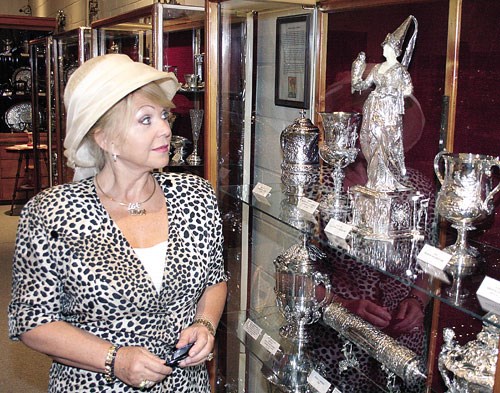Sculptor Lea Vivot said she considered it an honour and a privilege to create a bronze statue of the late Tommy Douglas, which she has gifted to the City of Weyburn and will unveil in one month's time once it has been installed.Vivot, who is internationally-renowned for her art, is originally from Czechoslovakia and currently makes her home in Kleinburg, Ont., with bases of operation in many different locales, including Toronto, New York, Acapulco (where she winters) and Prague, Czech Republic.After learning about the life and accomplishments of Tommy Douglas, including С����Ƶ known as the father of medicare in Canada, Vivot did some research into his life and approached the City of Weyburn with the proposal of doing a bronze statue.It was an honour for me to immortalize an immortal with my hands, Vivot told some city representatives and local committee members who fundraised to cover the cost of installing the statue.Coun. Nancy Styles told her upon meeting her, It's a tremendous honour for you to do this for us; from the people of Weyburn, we just thank you.Vivot agreed to waive her fees and donate the statue, on the condition that the city or a local group cover off the expenses of having the sculpture installed, which has been done. The sculpture was shipped to the city a few weeks ago, but with the request that she be present when it was unpacked.She made her first-ever visit to Weyburn to unpack the statue, arriving the evening of Aug. 9, and she stayed over until Aug. 11; during her time here, she visited the spot where the statue will be installed, and also toured such highlights of the city as the Soo Line Historical Museum and the T.C. Douglas Centre, and the Douglas memorabilia on display there.She will be back in Weyburn for the official unveiling of the statue, which will be in the alcove near the Riverfront Market boardwalk, on Friday, Sept. 10 at 3 p.m.Asked about the subject of her sculpture, Vivot said, I wanted to capture him not as a minister, nor as a politician, so I did something in between. He will be standing, talking, and looking dignified hopefully.She explained this statue will be much different than much of her work, as she is renowned for using benches as her trademark.She added she thinks highly of the former premier who was voted as the Greatest Canadian, saying, His contribution to life in general was monumental. I am pleased the City of Weyburn and the citizens of Weyburn allowed me to do it.Vivot admitted she at first had some difficulty deciding how exactly to depict Douglas. I had a difficulty with this sculpture, with me creating the sculpture, because it was so important. I had stage fright' so I couldn't know the right way, she said, explaining that usually when she works on a piece, It just happens. You work on it until it materializes for you.With her art taking her to many part of the world, Vivot has developed a talent for languages, but says she still prefers her art. I speak seven languages, but I speak best with my hands, she quipped.Vivot recalled she did a sculpture of an important politician when he was still alive, Pierre Elliott Trudeau, who she counted as a close friend and patron of her work.He loved my art and appreciated it. He said to me, Do you realize what you do to people when they see your art? They smile and stop to look at it and sit down on it Do you know what a strength you have? Look at the power you have!', she said.Asked for her thoughts about Weyburn, as this was her first time to the city, Vivot said, What a very pleasant surprise, that you have a very quaint small town but you have big things happening here! That's great; I didn't expect that, and I met these wonderful people who made a wonderful dream come true for me. I am looking forward to making the trip back.Promising to be back for the unveiling of the statue, Vivot said, I would especially like to see children at the unveiling; they should learn about history.Vivot was born in Sumperk, Czechoslovakia, and began schooling at the Prague School of Stage Design before she made a dramatic escape from that country when it succumbed to Russian control in 1968, when she was 18 years old. She said two teachers from Verona, Italy, were there as tourists, and they smuggled her out in their car.Her schooling in the years following included the Academia di Brera in Italy, the Ontario College of Art in Toronto, and the Art Students League in New York. She began as a sculptor in the 1970s doing bronze sculptures, and used benches as her trademark with life-size or over life-size bronzes. In one interview, she explained, I always liked to sit on benches where I could observe people either kissing or arguing.One of her works, called the Secret Bench of Knowledge, is located in front of the National Library of Canada in Ottawa, and includes inscriptions from writers from Canada and from abroad, as well as the general public, on the joy and value of reading.There are editions of the Secret Bench, Lost Paradise, located also in Montreal, Toronto and New York, all with handwritten messages expressing the hopes and fears of children.One bench sculpture is entitled The Game of Life, and is located in front of Sazka Arena in Prague, with messages from such well-known players as Dominic Hasek. Ivan Hlinka and Brett Hull.In 2003, Vivot received an award as The Most Distinguished Czech Woman in the World, and she dedicated statues of women to past, present and future laureates of this award.Some of her works are in museums and galleries around the world as well as private collections such as opera singer Placido Domingo, actor Alan Alda, and Trudeau as previously mentioned.
